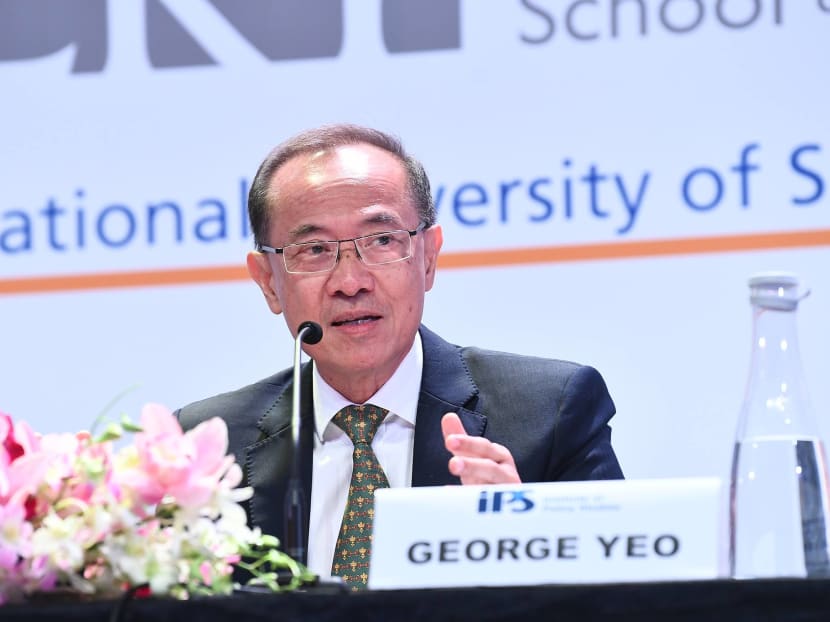‘Cold war’ and ‘cold peace’ between US and China could continue for decades, says George Yeo
SINGAPORE — The oscillating “cold war” and “cold peace” between China and the United States could easily continue for another 20 years, said Singapore’s former foreign minister George Yeo on Monday (Jan 28), even as he expressed optimism about current trade negotiations between the two sides.

Singapore’s former foreign minister George Yeo said US-China relations are the single most important relationship shaping the world today.
SINGAPORE — The oscillating “cold war” and “cold peace” between China and the United States could easily continue for another 20 years, said Singapore’s former foreign minister George Yeo on Monday (Jan 28), even as he expressed optimism about current trade negotiations between the two sides.
“I believe the current trade negotiations are likely to succeed because China will go 80 per cent of the way to meet US demands, not because they are afraid… but because they know time is on their side,” Mr Yeo said at the annual Singapore Perspectives conference organised by the Institute of Policy Studies.
Both countries meet this week for talks to try to end their trade war, but Mr Yeo noted American political scientist Graham Allison’s remarks last month that the anti-China mood in the US is going to get much worse.
“This trial of strength oscillating between a cold war and a cold peace will continue for easily another 20 years to come, each testing the other, America worrying, what does a rising China portend?” Mr Yeo told an audience of about 1,000 policymakers, academics, businessmen and others.
The rivalry will continue until the US is convinced that China’s actions are not committed with the intention of being a missionary or colonising power, he said — although panel moderator Professor Tommy Koh felt it to be a “benign view of China”.
Speaking with historian Wang Gungwu at a session on Singapore and the world, Mr Yeo said US-China relations are the single most important relationship shaping the world today. “If it’s bungled, all bets are off. All of us will be torn apart as countries, cities, as companies, as families,” said Mr Yeo, a visiting scholar at the Lee Kuan Yew School of Public Policy.
The US’ weakening of support for international institutions like the World Trade Organisation and United Nations under President Donald Trump may be to its advantage for the time being, but countries should fight against the breakdown of the international trading system for it will sharpen economic and political conflict around the world, he said.
Singapore, Japan and other countries should encourage China to join the Comprehensive and Progressive Agreement for Trans-Pacific Partnership (CPTPP), he added. This would encourage — or even force — the US to return to the table.
“But we must do it artfully. Coordinate negotiations so that they join at the same time, and whatever China is prepared to give the US, we say, give it to the (CPTPP),” said Mr Yeo. “And if the (CPTPP) includes China and the US, the World Trade Organisation will have to follow in its wake and you’ll have a safer world.”
Apart from the strategic contest in trade, Singapore’s Foreign Minister Vivian Balakrishnan said in a separate dialogue session that even if the US and China settle their trade disputes, things will “not be hunky-dory" after that.
“Because of the pervasiveness of the technology, we expect this strategic contest to be waged in other arenas: Defence, energy, cyber security and even outerspace,” he noted.
Both Professor Wang — chairman of the board of trustees at Iseas-Yusof Ishak Institute — and Mr Yeo stressed the importance of the Association of South-east Asian Nations (Asean) in buffering against big-power rivalries.
Mr Yeo said it is crucial for Indonesia, given its size, to take the lead. When he was in government, he made sure that Indonesia’s and Singapore’s positions were aligned as much as possible.
Another speaker, Dr Marty Natalegawa, Indonesia’s foreign minister from 2009 to 2014, said the US-China tussle can pull the regional grouping apart.
His view is that neither the US nor China will obtain permanent ascendancy over the other.
“It is a false choice for us to predict as if one will be pre-eminent, and therefore, we must be on the right side of this competition. I believe that the region, as it has been in the past, has defied dominance by one particular power,” Dr Natalegawa said at another panel discussion with former top diplomat Bilahari Kausikan.
“And there is no reason to assume that the future will be otherwise.”
Mr Yeo urged Singapore to maintain its big “cultural genome”, with historical and cultural connections to the region and the world, to be able to adapt to “a range of possible futures”.
“We cannot avoid, in Singapore, always having debates about race, language, religion, identity. Every link which connects us to China, India, Indonesia, the Middle East, every link is both a plus and creates problems. Everything is two-way; what connects is also a method of infiltration,” said Mr Yeo.
“So we have to adjust to all this. The day we decide that it’s too tiring to do all this, that day we shrivel and become inconsequential.”











